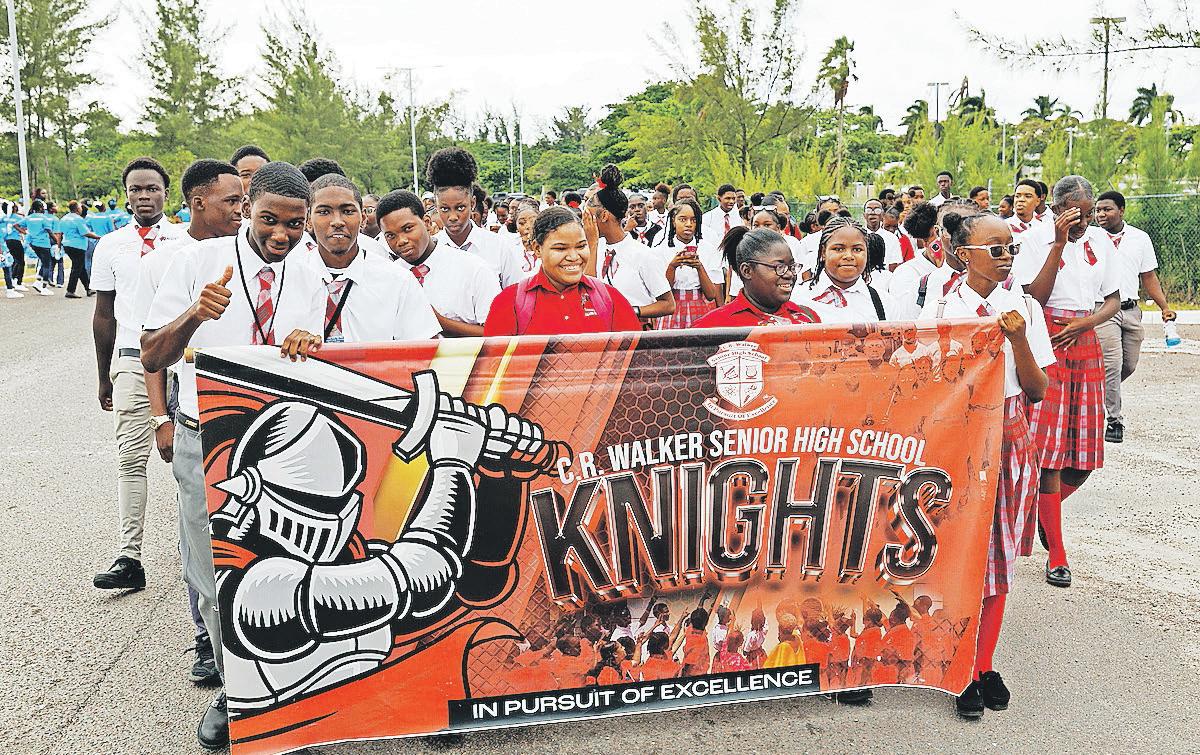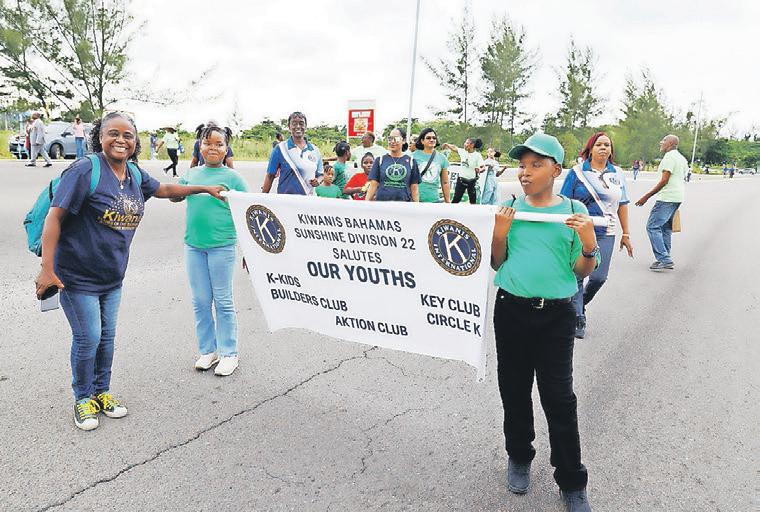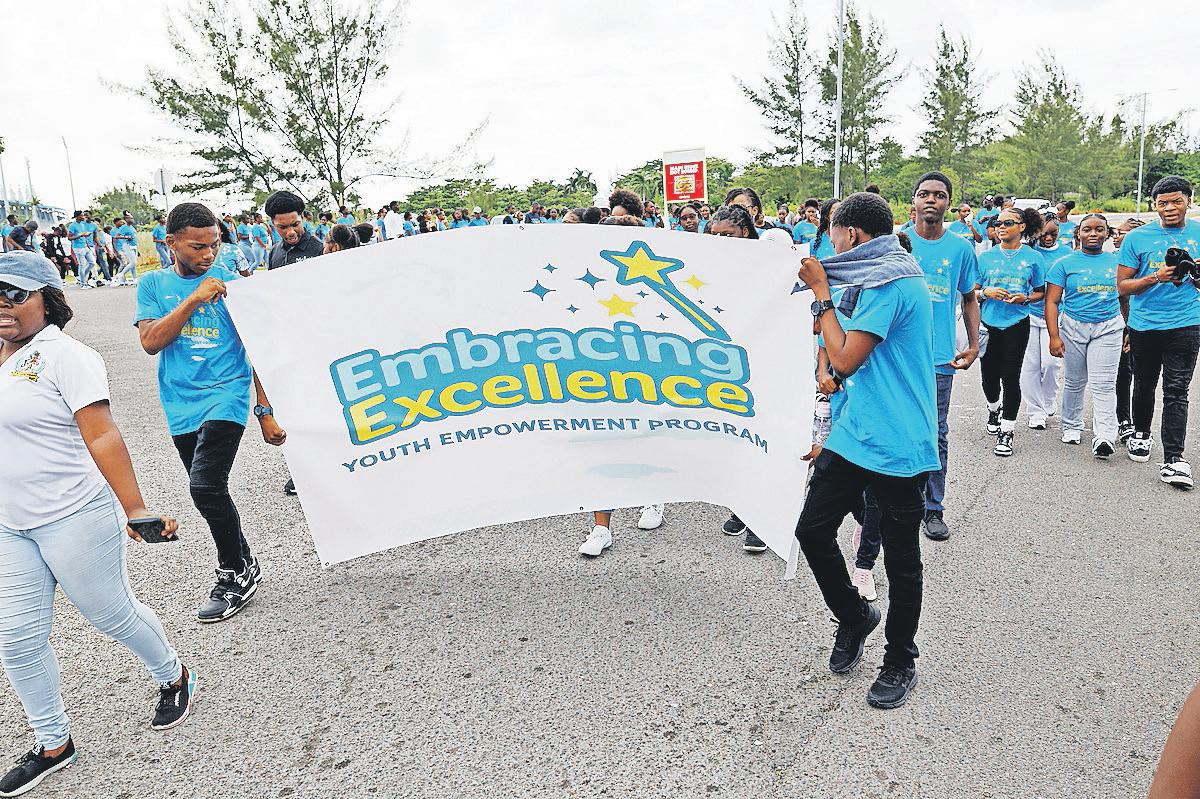MONDAY








16-year-old St Augustine’s College student reportedly fell from 27th floor of hotel on school trip
By AVA TURNQUEST
A 16-YEAR-OLD
Bahamian student died in Panama after reportedly falling from the 27th floor of a high-rise hotel while attending an international robotics competition in Central America. St Augustine’s College
confirmed the death of a student during a school trip to Panama City, where the school was participating in the FIRST Global Robotics Challenge. While the school did not initially release the student’s name, St Joseph’s Parish Council and Pastoral Team later identified her in a Facebook post as Madeline Thompson. According to Panamanian news outlet El Siglo, the incident occurred around 6:05am on Friday, when the teenager fell from the 27th floor to the 12th, landing in the hotel’s social area where the pool is located. Local reports said she was sharing a room with two classmates at the time.
TRAGEDY - SEE PAGE FIVE
Toastmaster killed in drive by while outside home on Cambridge Drive
By JADE RUSSELL
Reporter
Tribune Staff
jrussell@tribunemedia.net
DISTINGUISHED
Toastmaster Derek Garcia
Rolle was fatally shot in south-eastern New Providence on Thursday night, sending shockwaves of sadness and disbelief through the local toastmasters’ community.
Police said the incident occurred shortly after 11pm on Cambridge Drive, where officers responding
to reports of gunfire found a man lying outside a residence with apparent gunshot wounds.
Preliminary reports indicate that shortly after the victim exited the residence, the occupants of a darkcoloured Japanese vehicle opened fire in his direction before fleeing south onto Dover Avenue from Cambridge Lane. There is no known motive for the shooting.


By JADE RUSSELL AND LEANDRA ROLLE Tribune Staff Reporters
THE upcoming Boxing Day and New Year’s Day parades are facing growing uncertainty as conflicting reports emerge over which Junkanoo groups will participate in the government-run events and which will perform under the Junkanoo Corporation New Providence (JCNP). The divide has left
Madeline Thompson

By LEANDRA ROLLE Tribune Chief Reporter lrolle@tribunemedia.net
THE race for the Golden Isles seat heated up on Friday as four candidates were officially nominated to contest the upcoming by-election, each pledging change, opportunity, and more inclusive leadership.
The contenders are Brian Brown, Free National Movement (FNM); Darron Pickstock, Progressive Liberal Party (PLP); Brian Rolle, Coalition of Independents
Junkanoo fans questioning where the “true” parades will be held this Christmas season — with many saying they plan to follow the major A groups if they move ahead with JCNP’s promised independent events.
Scores of Junkanoo enthusiasts told The Tribune on Friday they would rather attend the JCNP parades, which are expected
(COI); and independent candidate Karen Kim Butler.
Supporters from all three political camps, dressed in party colours, gathered early at Anatol Rodgers High School, celebrating in the streets with small motorcades and campaign music. The PLP also staged a mini rally-style event.
While the process was largely smooth, tensions occasionally flared as supporters traded jeers, with some having to be restrained to prevent
confrontation.
COI leader Lincoln Bain clashed several times with police officers, accusing them of unfairly enforcing crowd limits against his party. Only 20 people were permitted on campus per candidate, but Mr Bain claimed officers allowed PLP supporters to exceed the limit — an accusation not supported by what The Tribune observed on the ground. Despite the friction, the day was marked by
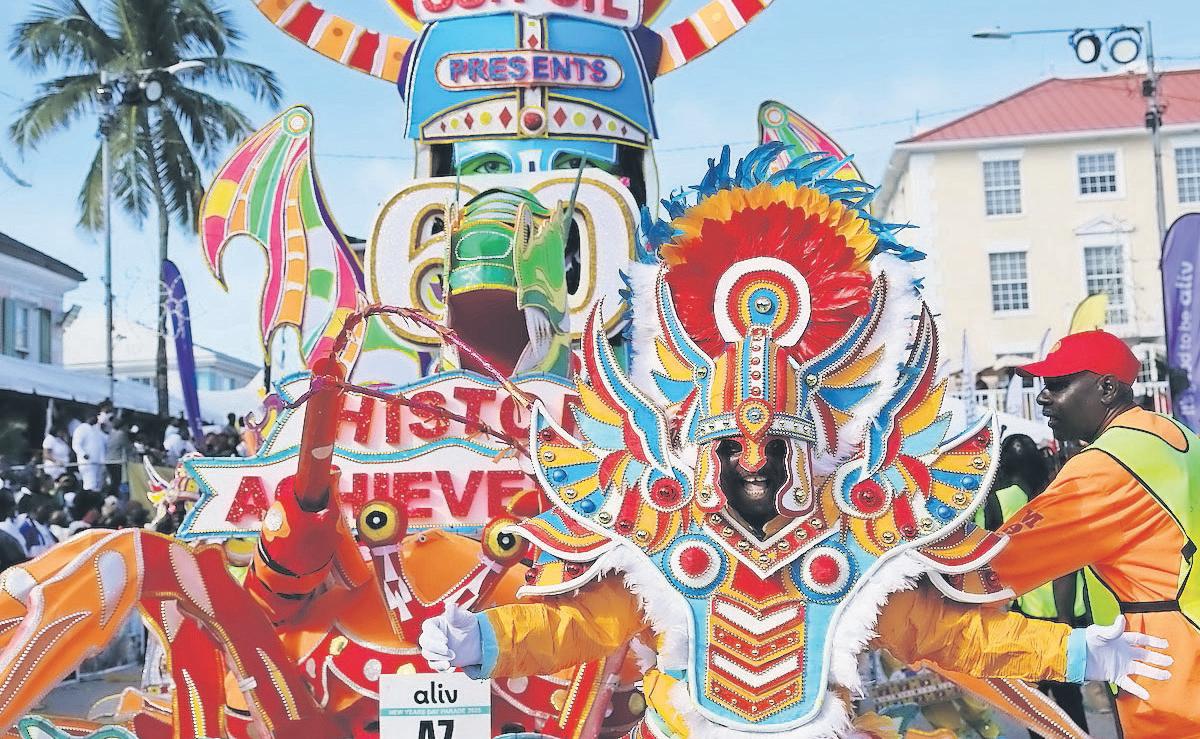

from page one
to feature some of the largest and most iconic groups — including the Saxons Superstars, the World Famous Valley Boys, Roots, and One Family — should those groups ultimately sit out the government’s parades.
and without broad consultation. The Tribune understands leaders are privately reassuring members to stay calm and prepare to go out on Bay.
“There’s a lot of confusion among Junkanooers,” one source told The Tribune
Carey, head of the Redland Soldiers, said they are “110 percent” behind the corporation.
“Everyone is on one accord,” Mr Carey said.
meetings.
“We just want the music, the energy, and the costumes,” she said.

Group leaders refused to answer calls or respond to requests for comment amid reports about division over the decision. The news of groups not participating in the government-led events caught many members by surprise, with group chats reportedly buzzing with calls for clarity.
Some members claim the latest decision is yet another example of the JCNP acting unilaterally
“It seems a lot of decisions were being made at the JCNP level on behalf of Junkanooers through their leadership or representation and then there wasn’t precise or clear communication with membership on those things.”
Confusion appears greatest among A Division members, while B Division leaders seem more unified, standing firmly with the JCNP. The leader of the Original Congos confirmed the group supports the JCNP, and Philip
“You might have one or two who might say ‘they don’t know, I don’t know’ for some reason or other, but you know, they just don’t be around.”
Some fans have urged the government to “suck up its pride” and reconcile with the JCNP, while others lamented the political tensions overshadowing a national tradition.
“Junkanoo is so pure, Bahamian and real. Now it’s turned into a legal and political mess,” said Family Island resident Yamease Swain, who added that the public didn’t care about press releases or backdoor
Many long-time Junkanoo lovers said they were disheartened by what they described as a cultural crisis. Antiko Fred Joseph said the ancestors who built the festival’s legacy “would not be pleased”, noting that while B groups are important, “80 per cent of attendees come for the big boys.”
Another resident, David Garrad, said: “In all my years of living, I’ve never seen it this bad. Honestly, it hurts to know that something so a part of our culture is going down this path. There is no point, everyone goes to Junkanoo to see the big boys, it’s unfathomable.”
Tourism concerns have also surfaced, with One Family member Jaydette Callender warning that scaled-down national parades could “dampen the country’s image” if key groups stay away.
“It’s about the cultural and economic ripple effect that follows when key groups sit out,” she said.
“The parade loses its spark, and the country loses part of what makes our holiday season so unique and vibrant.”
The JCNP announced Friday that it will host two independent community Junkanoo experiences on Bay Street this December and January at times that will not conflict with the government’s events. The organisation said the move followed its removal
midway through the 2025 season and would allow Junkanoo to be celebrated in its “purest, most organic form.”
However, the National Junkanoo Committee (NJC) has rejected reports that the major groups have withdrawn from the official parades, insisting preparations are “well underway” and that the national events remain on track.
“The major Junkanoo groups have not communicated any decision to withdraw,” the NJC said in a statement on Friday, adding that sponsors remain committed to supporting the parades.
Youth Sports and Culture minister Mario Bowleg did not respond to calls for comment up to press time.

By PAVEL BAILEY Tribune Staff Reporter pbailey@tribunemedia.net
A CROOKED ISLAND
farmer is appealing for government assistance after Hurricane Melissa devastated his five-acre farm, which had supplied fresh fruit to his community.
Meanwhile, Long Island
MP Adrian Gibson said farmers in his constituency suffered similar damage, though recovery efforts are now underway.
Michael Carroll told The Tribune his banana and plantain crops on Crooked Island were destroyed by flooding and winds estimated at 120mph.
Mr Carroll, who has farmed on the island for 14 years, said the storm left him discouraged and estimated it would take 18 months for his crops to recover.
He said he had more than 100 plantain trees, as well as coconut and papaya trees, and regularly supplied produce to residents and his own store.
“It’s pretty discouraging,” he said. “After you put all this time and effort, things look good, and then something like this comes through and knocks you down.”
Photos from his farm showed trees uprooted and strewn across the ground, surrounded by debris and standing floodwater.
Despite the setback, Mr Carroll said he remains hopeful that with financial assistance, he can rebuild.
“If the government would assist the farms, that would help me get back up,” he said. “You’ve got to clean up the farms you gotta get it all back up and running. See if we can get them growing again.”
Mr Gibson said several Long Island farmers also suffered crop damage and downed vegetation but added that the island was spared the scale of devastation seen during Hurricane Joaquin in 2015.
“Compared to Joaquin and compared to our previous experiences it’s not as catastrophic,” Mr Gibson said,
“most certainly not. But we do need whatever assistance incoming as it relates to government intervention and NGOs as we all try to reset and restore what has been lost during the storm.”
He said flooding was the main issue for Long Island, caused by poor drainage along roadways, which he intends to address.
Mr Gibson added that several properties lost roof shingles, including his own home, but utilities were being restored and downed telephone lines repaired.
He noted that some residents experienced Aliv service outages and said he has been in contact with the company’s CEO, John Gomez, to resolve the issue.
Mr Gibson was among the passengers on the first Bahamasair flight to Long Island on Sunday and said he continues to reach out to residents to ensure their needs are met. He added that he has arranged drinking water supplies for affected households.

By AVA TURNQUEST
THE United States has pledged continued support to The Bahamas in the wake of Hurricane Melissa, mobilising both government and private sector resources to assist with relief and recovery efforts across the southern and central islands.
US Embassy Nassau Chargé d’Affaires Kimberly Furnish said American agencies and partners acted before, during, and after the storm to help save lives, protect property, and aid recovery — even as the US government faced a shutdown.
“At every point — during the approach of the storm, as it passed, and now as recovery efforts begin — the people and government of the United States have been working to assist Bahamians,” Mrs Furnish said. “Even during our government shutdown, saving lives will always be a priority for the United States.”
She added that she was especially proud of how the embassy worked to mobilise private sector partners to help evacuate residents from Inagua, Acklins, Crooked Island, Mayaguana, and Ragged Island to New Providence.

Kimberly Furnish said American agencies and partners acted before, during, and after the storm to help save lives, protect property, and aid recovery — even as the US government faced a shutdown.
Several US-based organisations and individuals supported those efforts, including the Love & Life Foundation, Judah 1 Aviation, SpaceX, Dr Andy Ingraham, founder of the National Association of Black Hotel Owners, Operators, and Developers, and Rob Ceravolo, founder of Tropic Ocean Airways.
THE Bahamas Aviation, Climate and Severe Weather Network (BACSWN) played a key role in supporting evacuation efforts ahead of Hurricane Melissa, providing critical weather data that helped coordinate flights in collaboration with the US Coast Guard and the Disaster Risk Management Authority (DRMA).
According to BACSWN Chief Operating Officer Michael Strachan, the use of the Advanced Weather Information Processing System (AWIPS) proved vital in ensuring safe and efficient evacuations from islands in the storm’s path.
“Using AWIPS, BACSWN’s chief meteorologist Ed Holicky and our consultant from the National Center for Atmospheric Research (NCAR), Professor Roelof Bruintjes, were able to assist the US Coast Guard last week with getting all of the weather processed for the evacuation flights,” Mr Strachan said.
“Without that, we wouldn’t have been able to get the number of evacuations done that needed to be done, and it highlights the importance of BACSWN’s WX SenseNet and the Met Watch Office that we are setting up. It also shows how critical BACSWN’s role can be in national emergencies to assist with the coordination of evacuations. We look forward to expanding these partnerships once all of our networks are up and running.”
Professor Bruintjes said the operation marked a historic first for The Bahamas’ radar capabilities.
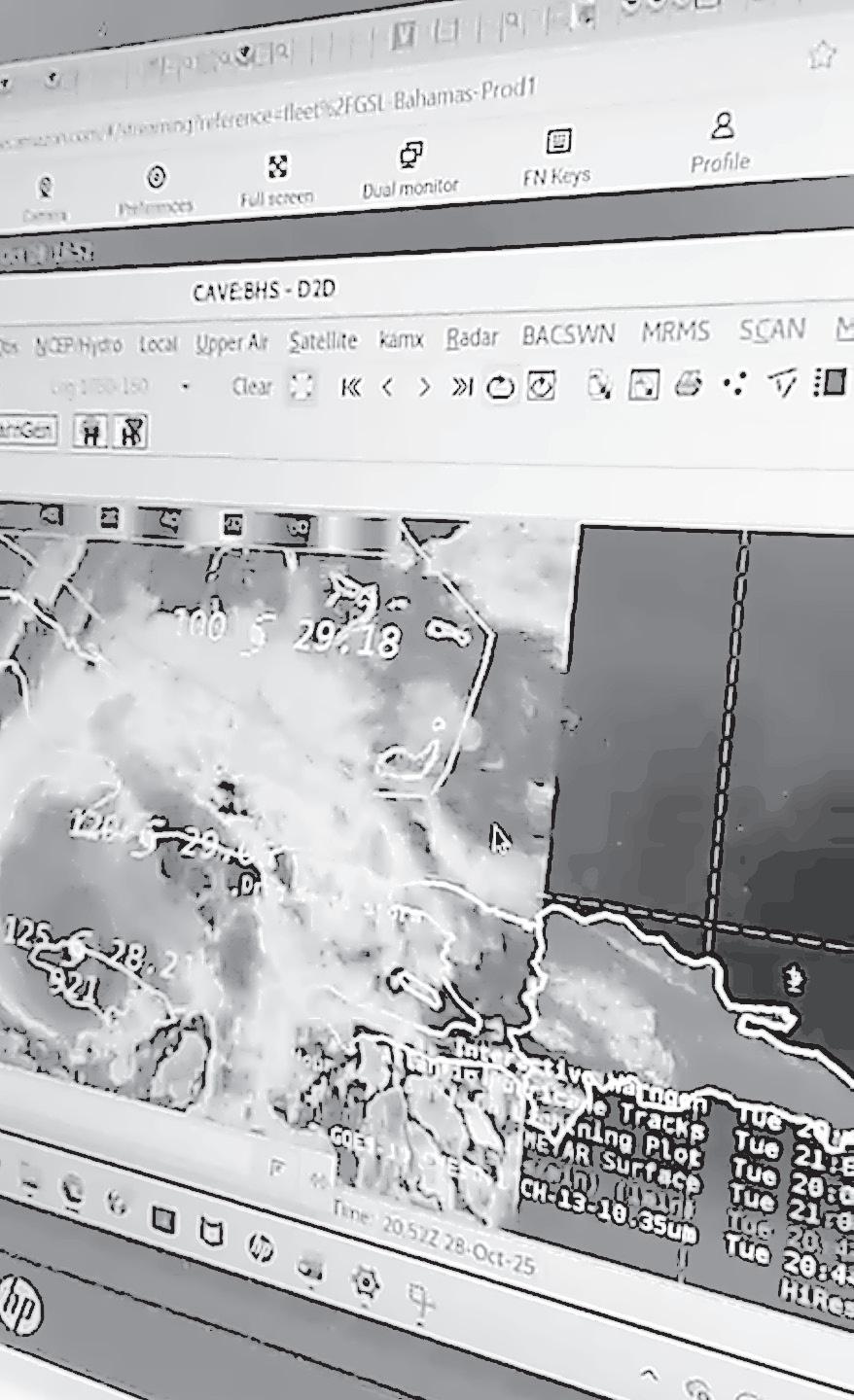
“The Met Department had installed these radars, but BACSWN restored and is now maintaining them to produce quantitative data,” he explained. “From the Long Island radar — operating for the first time — we were able to see
The US Department of State has also deployed a regional Disaster Assistance Response Team (DART) and activated Urban Search and Rescue (USAR) teams to assist with damage assessments and relief coordination across the Caribbean.
In The Bahamas, DART members have joined a disaster risk management specialist already stationed in-country to conduct rapid assessments and coordinate U.S. government support.
The U.S. Coast Guard has also deployed HC-144 Ocean Sentry aircraft from Air Station Miami to conduct post-disaster overflights of affected areas.
On Friday, Chargé Furnish joined Prime Minister Philip Davis, Opposition Leader Michael Pintard, Police Commissioner Shanta Knowles, and Defence Force Commander Floyd Moxey on a Coast Guard overflight to survey hurricane damage. “Our commitment to The Bahamas is unwavering,” Mrs Furnish said. “We are friends in good times, and our friendship remains constant during disasters like Hurricane Melissa.”

NOMINEES from page one
lively crowds and spirited celebrations.
Ms Butler, the first to file her nomination, pledged to challenge the status quo as an independent and help Golden Isles reach its full potential. She declined to outline her platform in detail, saying: “You will hear more about that as we go.”
Ms Butler, who ran for the FNM in Tall Pines in 2012, said her relationship with the party has been strained since her departure and believes Bahamians are now seeking a new direction.
Next to nominate was Mr Rolle of the COI, who urged voters not to be swayed by handouts.
“Do not sell yourself short. You are worth more than a T-shirt and a few dollars,” he said, listing concerns about flooding, mosquito control, illegal immigration, and environmental degradation in the area.
Flanked by senior party officials, including Prime Minister Philip “Brave” Davis, PLP candidate Mr Pickstock told supporters he is offering “real work, real results and real representation,” pointing to his ten-point plan for Golden Isles focused on road repairs, better drainage, improved transport, and community programmes.
“Golden Isles, give me one chance to prove that I will work harder for you and that everyone in our community will benefit,” he said.
“When families were in crisis, I showed up. When our community needed cleaning, I rolled up my sleeves. When young people needed guidance, I created opportunities,” he said.
He accused his PLP rival of being “out of touch,” claiming: “He’s loyal to Philip Davis and the PLP. He’s campaigning straight from the PLP playbook — show up before an election, pave a few roads, hand out contracts. Take a few pictures, and hope you forget their bad ways.”
A fifth would-be contender, retiree Craig Powell, attempted to file his nomination but was rejected after officials found “flaws” in his documents. He called the effort a “dry run” and vowed to try again in the future, saying education and a new community centre would be his priorities.
The upcoming by-election, triggered by the death of PLP MP Vaughn Miller, will be the twelfth held in The Bahamas in the past five decades. It will determine whether the governing party retains control of Golden Isles or cedes it to the opposition or an independent.
Both the prime minister and FNM leader Michael Pintard have downplayed the contest as a test of their leadership.
“This election isn’t about me or the Free National Movement,” Mr Pintard said. “It’s about whether the people of Golden Isles will get the best representation possible.”
FNM candidate Mr Brown, the last to arrive, highlighted his long record of community service.




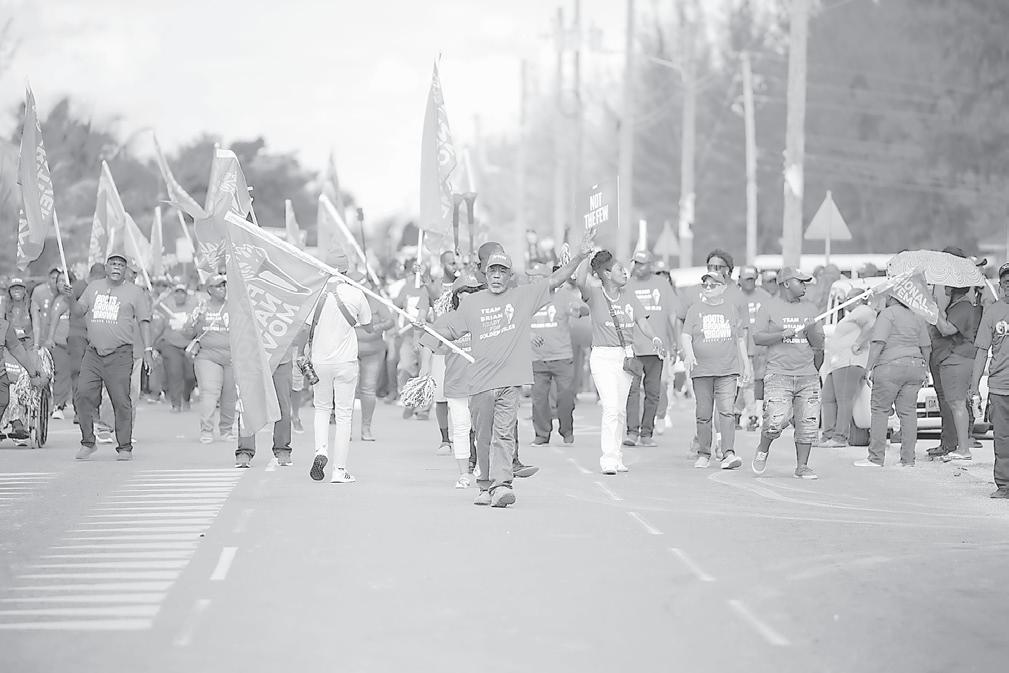
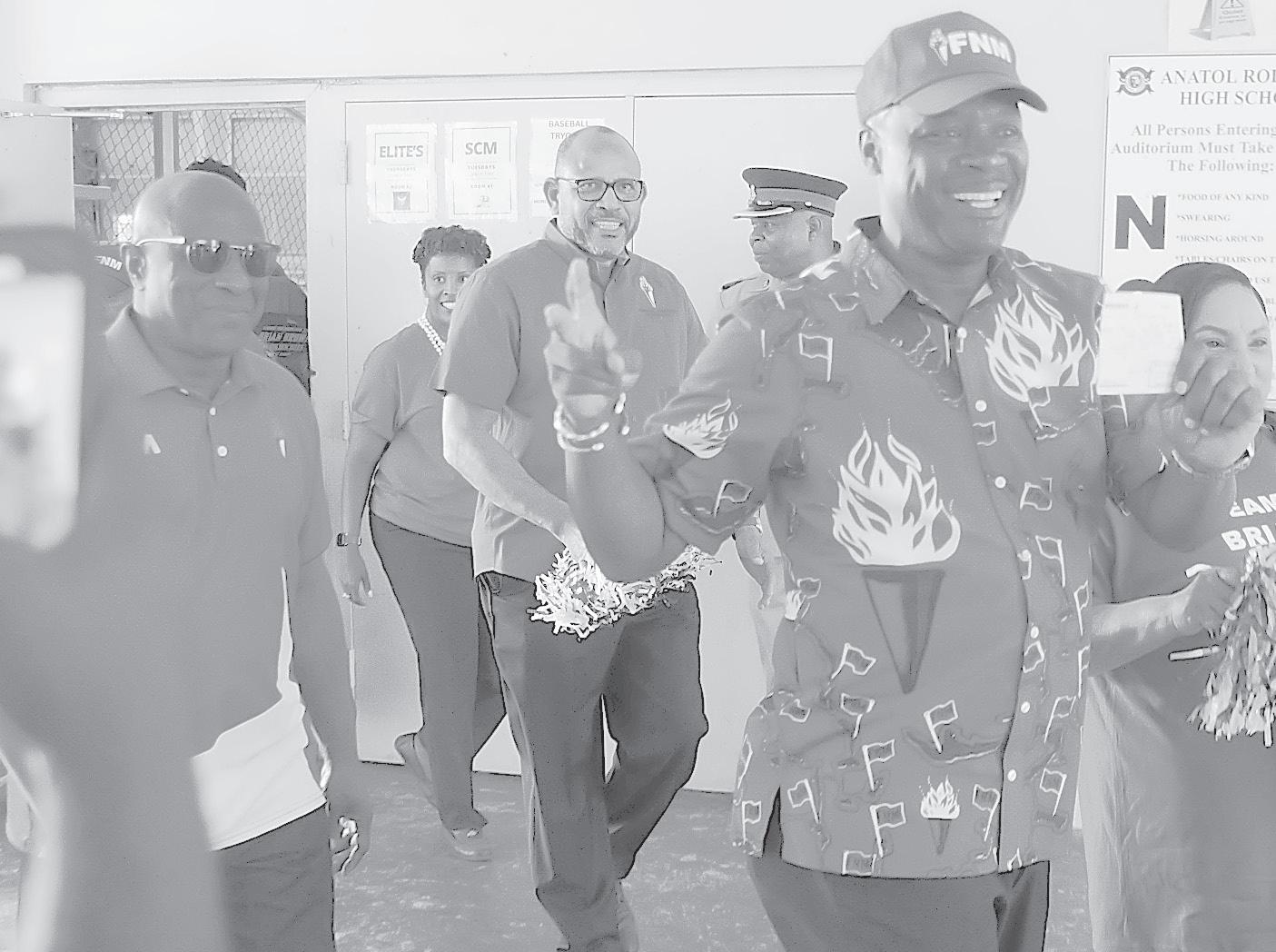

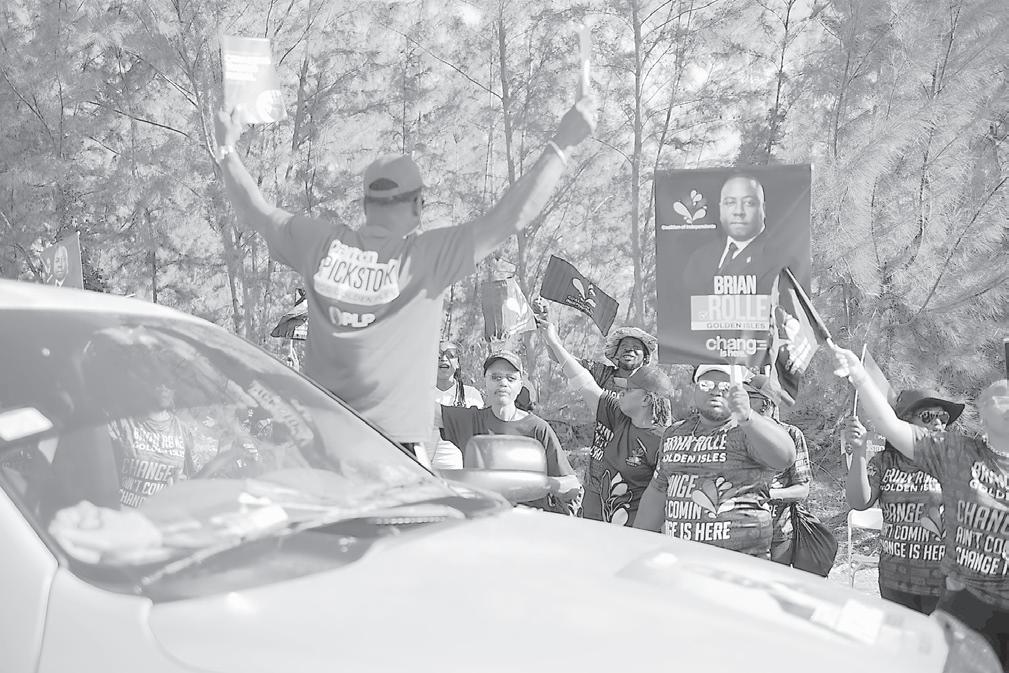




TRAGEDY from page one
Authorities in Panama have launched an investigation into the circumstances surrounding her death.
St Joseph’s Parish described Thompson, who had just celebrated her birthday on September 26, as a “cherished member of our parish family who served faithfully at the St Joseph’s Soup Kitchen every Saturday.”
“Her kind heart, gentle spirit, and willingness to help others reflected the love of Christ in all she did,” the parish’s statement read.
“We join her parents, Jerome and Shenique Thompson, her loved ones, and the entire St Augustine’s College community in mourning this heartbreaking loss.”
In a statement issued yesterday, the school said its delegation was accompanied by a parent, a chaperone, the principal, and members of the faculty.
“It is with the deepest sorrow and heavy hearts that St Augustine’s College confirms the tragic passing of one of our students in Panama City,” the statement read.
“The loss is felt profoundly by our entire school family. Our thoughts, prayers, and unwavering support are with the student’s family, loved ones, classmates, teachers, and all who are grieving during this unimaginable time.”
The school said it is in close communication with Panamanian authorities and is providing support where needed.
MURDER from page one
Following confirmation of Mr Rolle’s death, tributes poured in across social media from fellow toastmasters who remembered him as a dedicated leader, mentor, and friend.
“It is hard to put into words how I feel. I still cannot believe you are gone. You encouraged me. You pushed me to the forefront. You believed in me. You were an excellent leader and mentor. You worked hard and were a great example to us all,” Toastmaster member Franky Camille wrote.
“You will be missed. You are the real champion.
I salute you, my friend.
I am glad that you had a relationship with Christ.”
Another mourner said Mr Rolle’s kind spirit had left a lasting impact on their life, adding that he deeply inspired others.
On Thursday, police said Emergency Medical Services examined the victim and confirmed there were no signs of life. In a statement to members across The Bahamas, Toastmasters International expressed sorrow over his passing.
“DTM Derek was someone we could call on at any time, always ready to show up, lend his support, and give of himself selflessly,” the organisation said. “He has been there for us time and time again, and his passing leaves a tremendous void in our Toastmasters family.
“Let us keep his family and loved ones in our thoughts and prayers during this difficult time. May we also honour his legacy by continuing the work and service he so passionately embodied.”
According to The Tribune’s records, this marks the country’s 71st murder for the year.



NULLIUS ADDICTUS JURARE IN VERBA MAGISTRI
“Being Bound to Swear to The Dogmas of No Master”
LEON E. H. DUPUCH, Publisher/Editor 1903-1914
SIR ETIENNE DUPUCH
Kt., O.B.E., K.M., K.C.S.G., (Hon.) LL.D., D.Litt .
Publisher/Editor 1919-1972
Contributing Editor 1972-1991
RT HON EILEEN DUPUCH CARRON, C.M.G., M.S., B.A., LL.B.
Publisher/Editor 1972-
Published daily Monday to Friday
Shirley & Deveaux Streets, Nassau, Bahamas N3207 TELEPHONES
News & General Information
(242) 502-2350
Advertising Manager (242) 502-2394
Circulation Department (242) 502-2386
Nassau fax (242) 328-2398
Freeport, Grand Bahama (242)-352-6608
Freeport fax (242) 352-9348
WEBSITE, TWITTER & FACEBOOK
www.tribune242.com

@tribune242 tribune news network

Trump’s squeeze of Venezuela goes beyond ‘Monroe doctrine’
A massive military buildup in the Caribbean has sparked speculation that the U.S. is now engaged in its latest chapter of direct intervention in Latin America.
For now, at least, President Donald Trump has walked back suggestions that Washington is eyeing strikes inside Venezuela, seemingly content with attacking numerous naval vessels under the guise of a counter-narcotics operation. But nonetheless, U.S. presence in the region will enlarge further in the coming weeks with the arrival of the world’s largest aircraft carrier, the USS Gerald R. Ford.
As a scholar of U.S.-Latin American relations, I know the actions of the current U.S. administration smack of a long history of interventions in the region. Should escalation develop from attacks on ships into direct military confrontation with Venezuela, such aggression would appear to be par for the course in inter-American relations.
And certainly, governments across Latin America – in and out of Venezuela – will place it in this historical context.
But while it does hearken back to some quasi-piratical practices of the U.S. Navy, the military buildup now is in key respects both unprecedented and shocking. It could also damage U.S. relations with the rest of the hemisphere for a generation to come.
In the most obvious way, deploying a flotilla of warships to the southern Caribbean evokes dark echoes of “gunboat diplomacy” – the unilateral dispatch of marines or soldiers to strong-arm foreign governments that was especially prevalent in Latin America. One reliable account tallies 41 of these in the region from 1898 to 1994.
Of these, 17 were direct U.S. cases of aggression against sovereign nations and 24 were U.S. forces supporting Latin American dictators or military regimes. Many ended in the overthrow of democratic governments and the deaths of thousands. From 1915 to 1934, for example, the U.S. invaded and then occupied Haiti and may have killed as many as 11,500 people.
During World War II and the Cold War, Washington continued to dictate Latin America’s politics, showing an eagerness to respond to any perceived threat to U.S. investments or markets and backing pro-Washington dictatorships such as Augusto Pinochet’s rule over Chile from 1973 to 1990.
Latin Americans have, by and large, chafed at such naked displays of Washington’s power. This opposition from Latin American governments was the main reason that President Franklin D. Roosevelt gave up interventions with his “Good Neighbor” policy in the 1930s. Intervention continued, though, throughout the Cold War, with moves against leftist governments in Nicaragua and Grenada in the 1980s.
The end of the Cold War did not quite end military interventions. Some U.S. armed forces still operated in the hemisphere, but, since 1994, they had done so as part of multilateral forces, as in Haiti, or responding to invitations or collaborated with host nations, for instance in anti-narcotics operations in the Andes and Central America.
Showing respect for national sovereignty and non-intervention – both sacred principles in the hemisphere – especially in the context of rising drug violence, has largely quieted the resistance to the presence of U.S. troops in the largest nations in the hemisphere, such as Mexico and Brazil. So is Trump merely reviving a long-abandoned stance on the U.S. role in the region?
Not even close. In two key ways, aggression against Venezuela or any other Latin American country now – rationalized by Washington as a response to insufficient law enforcement against drug-running –would be dangerously unprecedented. First, it would blow out of the water the age-old justification for U.S. armed intervention called the Monroe Doctrine. Since 1823, when President James Monroe announced it, the U.S. has aimed to keep outside powers out of the republics of the hemisphere.
Once a Latin American people won its independence, Washington believed, it had the right to keep it, and the U.S. Navy helped in any way it could.
By the early 20th century, that purported help took on the look of a policeman patrolling the Caribbean Sea on a beat,
wielding what then-U.S. President The-
odore Roosevelt called a “big stick” and keeping Europeans from landing and, say, collecting debts. Sometimes this was done by having the Marines land first and move a country’s gold to Wall Street. An old political cartoon shows a map of people looking at naval vessels.
Even during the Cold War, the Monroe Doctrine could be logically invoked to keep the Soviets out of the hemisphere – whether in Guatemala in 1954, Cuba in 1961, the Dominican Republic in 1965 or Grenada in 1983.
Often, as in Guatemala, the Soviet link was weak, even nonexistent. But there was still a thin thread of keeping out a “foreign ideology” that seemed to keep Monroe relevant.
The doctrine died a surer death with the 1989 invasion of Panama to remove its rogue leader, Manuel Noriega, convicted of drug-running and guilty of trouncing his country’s democracy. No one fingered an extra-hemispheric accomplice.
Noriega’s removal by about 26,000 U.S. troops might be the closest parallel to Trump’s targeting of alleged drugs boats in the Caribbean. Trump has already – and repeatedly – alleged Venezuelan President Nicolás Maduro is, like Noriega, not the head of state of his own country and therefore indictable. More fantastically, he has alleged that the Venezuelan leader is the head of the Tren de Aragua gang that has been designated a “foreign terrorist organization” by U.S. authorities. It is not too big a leap from there to calling for – and participating in – the overthrow of Maduro on the grounds of removing an international “narco-terrorist.”
But even there, the parallel with Panama diverges in a crucial way: A U.S. attack on Venezuela would be far different in scale and geography. Maduro’s country is 12 times larger, with about six times the population. Its active troops number at least 100,000. In all of the U.S. invasions and occupations of Latin America, none has occurred in South America or in a large country.
To be sure, troops from “the colossus of the north” invaded Mexico several times, beginning in 1846, but never did they hold the entire country. In the Mexican War, U.S. troops soon retreated after 1848. In 1914, they occupied a single city, Veracruz, and in 1916, they chased around a bandit in the Punitive Expedition.
In all these episodes, it found taking parts of Mexico expensive and unproductive.
And a U.S.-provoked regime change in a sovereign country today, such as in Venezuela, would likely trigger a massive resistance not only from its military but throughout the country.
Maduro’s threat of a “republic in arms” should the U.S. invade might be bluster. But it might not. Many experts predict that such an invasion would meet with disaster. Maduro has already asked for military assistance from Russia, China and even Iran. Even without such help, the mobilization of U.S. assets in the Caribbean is no guarantee of success.
And while many governments in the rest of the hemisphere would no doubt love to see Maduro gone, they would dislike more the method of his going. The presidents of Colombia and Mexico have criticized the attacks, and others have warned of the resentment in the hemisphere were an intervention to follow. In part, this is informed by the U.S. interventionist past in Latin America, but it also comes from a place of self-preservation, particularly among the left-leaning governments who have already drawn Trump’s ire.


EDITOR, The Tribune.
I AM a teacher. The events of the past few weeks have compelled me to write this letter. I have taught for 15 years. Over these years I have come to understand that we do not matter. Even though the Minister said we matter and she puts ads on the television saying we do, we really don’t.
How did I come to this conclusion? For years we have had to work in hot classrooms. The ceiling fans the ministry put in year after year do not cool the room. We asked for standing fans and very few were purchased. We are the animals that must perform in spite of our conditions.
As President Luiz Inácio Lula da Silva of Brazil said, “If this becomes a trend, if each one thinks they can invade another’s territory to do whatever they want, where is the respect for the sovereignty of nations?”
Venezuela is, contrary to the White House’s statements, not much of a producer or trans-shipment point of narcotics. What if Trump turned his sights on other government even more compromised by drug corruption, such as Mexico, Colombia, Bolivia and Peru?
The concern there will be over becoming the next domino in line.
Alan McPherson Professor of History,
Temple University
We teach children from all kinds of backgrounds with all types of attitudes. If you complain about the behavior of these children to administrators, you are told you have a classroom management problem. However, on the days the one or two problematic children are absent, your classroom is peaceful. The administrators know who the chronically rude children are. They may need counseling or they may need punishment. Administrators should deal with them and their parents so teachers can teach their classes peacefully. Teachers work hard preparing students for athletic and academic competitions. The children get awards but teachers get nothing. Some athletic coaches may get extra pay, but most of us get nothing. I know of bankers, lawyers and even clerks in doctors’ offices who get Christmas bonuses. What about teachers? How about a fruit basket, some money, a laptop or a gift card for coaching students who place first , second or third in competitions? We are the robots who are expected to perform with little to no incentive. I can hear people saying, “They only want money.”
Yes, we want and need money because money answers all things. If we did not care about the children, we would not do what we do.I have my own children, but I have bought tennis, shoes, sweaters, jackets, textbooks and given lunch money to countless children over the years quietly. So yes, I need money because it is hard to make what I am getting stretch in a million directions. And just like the children, teachers appreciate gifts of encouragement because we work hard. There may be some bad apples in the bunch, but the majority of teachers work hard and try their best.
The Awards implemented by the Ministry of Education donot do a good job of highlighting the real heroes in education. For the most part, the people nominated are favored by administrators. I am not saying that they don’t deserve to be recognised. However, teachers who do not suck up to their superiors but work hard and get results are intentionally overlooked. They need to allow teachers to nominate people.
Another problem is the Central Bank controls how many deductions a public servant can get. The Prime Minister needs to change that. Let me decide what I do with my money because it is mine. I should not be controlled by Central Bank because I have a family to take care of and I should be able to use my money freely. This should be illegal in a democratic country. I cannot go to central bank when I need money, so let me use my money how I see fit.
I know teachers do not matter because in many of us are treated poorly and spoken to poorly by superiors.
Teachers are treated like we are at the bottom and we don’t count. Yet, the work we do affects thousands of lives. In other countries teachers are paid well and respected. Here, it is clear whether you quit or stay does not matter. The government will find foreign teachers to bring in but this is not right. This is the Bahamas. We should have Bahamian teachers who will teach our culture and the worship of our God to the generations coming up. We may need help in a few areas but the majority of our teachers should be Bahamian.
If teachers mattered, the government would cut the 60 million for consultants in the budget and give teachers a decent salary increase. If the government wants to do it, they can. Why do we have to protest to be paid fairly? Why were people who are already making a large salary paid retroactively from September last year, but teachers cannot have the same? Regardless of how the government feels about the union leaders, it is us , the teachers who need and deserve the increase, not the union leaders. I feel like ministry and government officials sit behind closed doors and laugh at us. I do not believe they are concerned. If they were, they would automatically give us a decent increase. The sad thing is Bahamian teachers have been resigning in a country where Bahamians are supposed to be first. It’s not about parties or politics. It is about a group of people who lay the academic foundation for today’s children and for generations to come. If the government cannot see the importance of these people, then they are blind and our country is in trouble.
A TEACHER Nassau, October
Ava Turnquest Tribune Digital Editor aturnquest@tribunemedia.net
POLICE Commissioner
Shanta Knowles yesterday renewed appeals for the mother of a newborn baby found abandoned in bushes off Marshall Road
to come forward, saying officers are concerned for her wellbeing.
“I hope we could find her to make sure that she’s okay and so she could get some medical attention,” Commissioner Knowles told The Tribune yesterday. “Unfortunately,
we have not located her as yet, and so we need to appeal to her to come forward so that she can get some medical attention.”
The baby boy, with his umbilical cord still attached, was discovered crying in the bushes as rain began to fall last
Monday, October 27. Police said a passerby heard the infant’s cries shortly after 9am and called for help. Emergency Medical Services responded and took the baby to hospital, where he was later reported to be in good
health. Police continue to investigate the matter and have urged anyone with information to contact them.
Chief Superintendent Darron Nixon, officer in charge of the Carmichael Police Station, previously said that the mother may have been in crisis and emphasised that support and counselling are available. Authorities say the baby remains in hospital care as social services officials continue to assist in the investigation.
Pavel Bailey Tribune Staff Reporter
pbailey@tribunemedia.net
A MAN was sentenced to 22 years in prison on Friday for attempting to kill his roommate, whom he falsely believed was having an affair with his wife.
Joaquen “J” Augustine, 23, was convicted of attempted murder by a 6-2 jury verdict and sentenced by Justice Guillimina Archer-Minns.
Prosecutors said Augustine stabbed Deno Delancey multiple times during an unprovoked attack at their apartment on Allen Drive around 6.55am on January 7, 2022.
The court heard that the
men exchanged morning greetings before the victim prepared to leave for work. As he approached the front door, he suddenly felt a sharp pain in his neck and realised he had been stabbed by Augustine with a black-handled knife. A struggle ensued during which Mr Delancey was stabbed several times. He managed to retreat to his bedroom and call his brother, Donald Tucker, to alert police and request help. The convict blocked the front door and refused to surrender the knife. The victim then drew a small knife from his own pocket and engaged Augustine, eventually subduing him in a headlock and disarming him before
Pavel Bailey Tribune Staff Reporter pbailey@tribunemedia.net
TWO men were remanded to prison on Friday in connection with the fatal shooting of 20-year-old Mekhi Taylor, who was gunned down while standing outside a parking lot with friends on University Boulevard last weekend.
Prosecutors allege that Mandingo Cartwright, 22, and Christiano Thompson, 19, drove up in a Japanese vehicle and opened fire on Taylor shortly before 2am on October 25. During the same incident, the pair allegedly attempted to kill Bruce Russell and Tyrone Jones.
Taylor was taken to hospital, where he later died of his injuries. In the hours before the shooting, he had reportedly spent the evening socializing with family and
friends. His co-workers later described him as hardworking and kind.
One of the accused, Cartwright, is said to have survived an attempted hit earlier this year, allegedly carried out by Ishmael Newry on Burial Ground Corner on April 10.
The defendants were not required to enter a plea when they appeared before Senior Magistrate Kara Turnquest Deveaux on a charge of murder. The matter will proceed to the Supreme Court by way of a Voluntary Bill of Indictment (VBI).
They were advised of their right to apply for bail in the higher court and were remanded to the Bahamas Department of Correctional Services until their VBI is served on January 22, 2026. Inspector Wilkinson served as the prosecutor.
Pavel Bailey Tribune Staff Reporter pbailey@tribunemedia.net
A MAN awaiting trial for two murders and the attempted murder of five police officers has been denied bail by the Supreme Court.
Keno McKenzie, 30, was refused bail by Justice Franklyn Williams on five counts of attempted murder and five counts of possession of a firearm with intent to endanger life.
Justice Williams noted that McKenzie was already on bail for murder at the time of the alleged offences and had previously served a oneyear prison sentence for bail breaches on September 29, 2023. The court also heard that McKenzie’s relatives, who acted as sureties, had sought to have his bail revoked on May 24, 2023, saying they could no longer locate or monitor him.
Although McKenzie argued that the evidence against him was “inherently weak” and unlikely to lead to a
conviction, Justice Williams ruled that the case appeared strong.
He denied bail, citing the risk to public safety and the potential for retaliatory violence against the accused, adding that no bail conditions could adequately mitigate that risk.
McKenzie had been on release for the 2019 murders of Ferdinand Agenor, 54, and Daniel Sterling, who were killed hours apart in Englerston on February 10 of that year. While on bail for those charges, he allegedly breached his curfew seven times between April 10 and July 15, 2023.
Police allege that on September 20, 2023, officers responded to gunfire near Miami Street, where McKenzie opened fire in the direction of ASP Melanie Allen, Inspector Rico Brown, PC Clifford Bain, and PC Arnold Taylor, forcing them to take cover behind a police vehicle.
Geoffrey Farquharson represented the accused, while Karine McVean served as the prosecutor.
escaping.
Mr Delancey was taken to hospital in the back of his family’s truck. Dr Emmanuel Joseph, the attending physician, said the victim suffered stab wounds to the head and neck and a partially amputated right little finger. He described the injuries as life-threatening without immediate medical intervention.
The victim described the attack as an “unprovoked blitz” that left him with mental trauma.
Police later arrested Augustine, who also had stab wounds to both shoulders. He initially claimed he acted in
self-defence, alleging that the victim attacked him first.
When questioned about his motive, Augustine told officers he suspected— without evidence—that Mr Delancey was sleeping with his wife, who also lived at the apartment. He claimed that the pair spent a lot of time together.
Prosecutors Uel Johnson and Tennielle Bain called the assault a ‘callous, deliberate and heartless attack on the sanctity of another’s life’, urging the court to impose a sentence between 30 and 60 years.
Defence attorney Brendalee
Rae argued that her client showed signs of mental decline, as did his late mother, and that his family had mistakenly attributed their struggles to “Obeah”. She said Augustine was capable of rehabilitation as he wished to receive psychological treatment and learn a trade while incarcerated.
Ms Rae added that Augustine had no prior convictions and acted out of emotional distress, particularly as his wife was pregnant at the time. She asked for a 10-year sentence, insisting the incident was completely out of character and her client wished to be
able to provide for his family upon his release. Justice Archer-Minns noted Augustine forced the victim to relive his trauma through the trial, adding the attack left Mr Delancey with permanent scars and disfigurement. In sentencing him to 22 years, the judge said she wanted to send a clear message that violence “in the heat of the moment” still carries serious consequences. She recommended Augustine receive counselling and vocational training while imprisoned. Time already served was also taken into account.
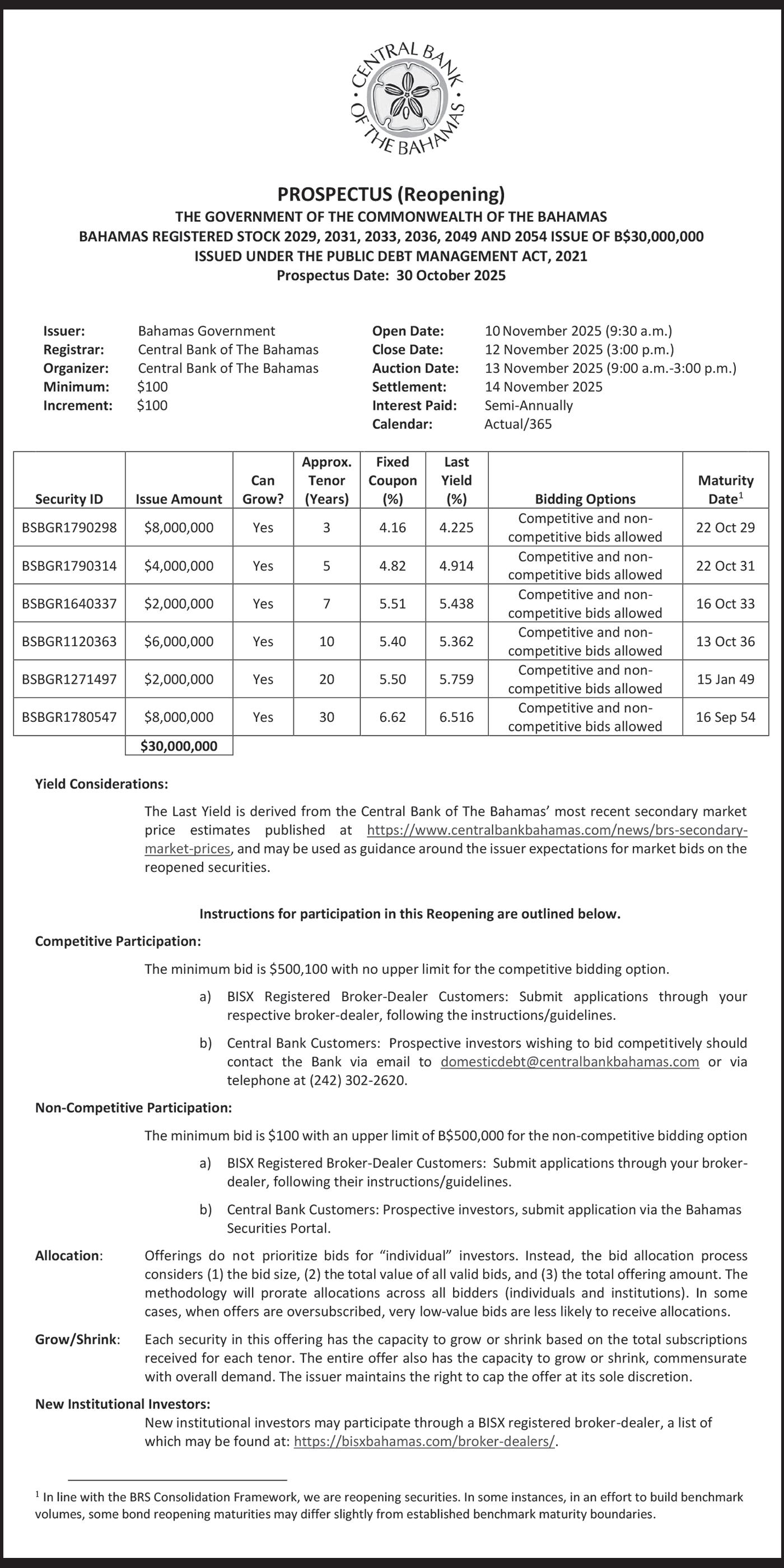


By Malcolm Strachan
THE road toBay for Junkanoo this yearis proving harderthanever.
Throughout this year, the tensionshavebeenbuildingas thedispute betweengovernment, the Junkanoo Corpora-

tionof NewProvidence (JCNP) and the various groups hasbeen simmering –andisnowboilingover.
Last week, theword came out thatthe JCNPwould not takepart inthis year s Boxing Dayand NewYear parades –andwiththem, ahostof groupswould nottakepart. No Saxons, noWorld Famous
last year’s paradesdue to continuous governmentinterference” That revolvedaround the Ministry ofYouth, Sportsand Culture,ledbyMarioBowleg, announcingthatTheWayForward ValleyBoys, whichsplit off from The World Famous ValleyBoys, wouldbeallowed to take part in the parades thatyear – even thoughthegroupshadalready drawn their numbersfor the paradeorder.
Atthe time,theJCNP chairman, Dion Miller, said: Prime MinisterHubert Alexander Ingraham never interfered with the administrationof Junkanoo.PrimeMinister PerryChristie neverinterfered with the administrationof Junkanoo.PrimeMinisterHubertAlexanderMinnis never interferedwith theadministrationofJunkanoo.”
Thisyear,whataboutPrime Minister Philip “Brave” Davis? Don t bringmeinto it,” he saidrecently, which is hardlyleadingfromthefront.
Allthrough theyear,the clash betweenthe twoValley factionshas rumbledon,including in thecourts. After

withit”andhadnoresponse.
feature theSaxons, Roots, One Family, the Original Valley Boys, the Original Congoes,the RedlandSoldiers,theMightyEaglesanda dozenDdivisiongroups.
Thisis nottheend ofour story,” readthe statement. “It istherebirthofamovement.
Ifallthis comesacrossasa mess,that sbecauseitis.
Valley Boys, noOne Family, no Roots,and a bunchof B groupsbesides. Is thisreal? Oris thisjust brinkmanship–athreattoget thegovernment tofallin line?Overthe week,Italked to a bunchof Junkanooers to get afeel of whatthe members felt – and those feelings arestrong.
First ofall, though,remember thishasn t happened overnight. Last December, remember,the JCNPwarned it was considering cancelling
onecourt victoryfor theWay Forward group, led by the prime minister s brother, Trevor Davis, Mr Bowleg used thatruling tojustify withholding seedfunding from theWorld Famous group,led byBrianAdderley. Then another court victory comes along,this timefor the other side, withthe Court of Appealsaying theRegistrar General permitting the registrationof MrDavis’ group was beyond belief . Suddenly, Mr Bowleg was saying he would “let the court deal
Ontopof that,thegovernment seemsto havebeen trying to wrest control of the parades themselves from the JCNP. TheJunkanoo Authority Bill wasput forward, creatinga statutoryauthority tooversee themanagement, funding and operation of parades acrossThe Bahamas, includingthe traditionalBay Streetparades. TheJCNPresisted – and much was made overasupposedpolltoutedby thegovernment thatsaid groupssupportedthebill.
There were mixed responsestothat – and from the peopleIhave talkedtothis past week, mixed feelings continueallacrosstheboard.
After last week s story about majorgroups pulling outofthis year’s parades, the National Junkanoo Committee(NJC) – which had
been charged with organising eventsthis year – put outa statement saying preparations were well underway and everything was on track, adding that groupswere in their shacks building, designingand preparingto bring their music, costumes and creativity toBay Street this Christmas season . It was a clarification that lacked details – namely which groups wouldbetakingpart.TheNJC said it hadnot received any notifications fromgroups aboutawithdrawal–butthere was nocommitment either thatthegroupswouldattend.
TheJCNP, meanwhile,put out its own statement, saying itwouldhosttwoindependent Junkanooexperiences onBay thisDecember andJanuary that would not conflict with festivities organised by the government.
Thoseevents,itsaid,would
--Junkanoo participant
There s no joy in it this year,” one participant told me. “Youjust can’t get into the spiritof itwhen everybody fighting.You tryto sit downto getyourcostume readyand youdon’t knowif you’reeven goingto beon Bay.It shard,man.
Another toldme: There s peoplesaying theynoteven gonnabother thisyear.They just so tired andsick of it, whatever wayit turnsout. Why do all this,why all in sucharush?”
Whilethe frustrationis widespread,another saidthat something needed be done, saying: “Governments have been talking about regulating tokeepJunkanooaccountable so I’mglad thisishappening, butit needsto keepthe politics out ofit. So many thinkingthis isdone tohelp Bravebrother soyougotta keep the twothings sep-
arate.” Still anotherJunkanooer hadastark warningforthe government for the upcoming general election: They should takeheed. Kill Junkanooandtheyout.”
Another took issuewith the JCNPitself, saying: “The JCNPtalk alot,but thereare issues with the parades that haven’t been solvedfor years likethe gapbetweengroups, theseating, thescoringand more sosomething needed doing.”
What was clear from the peopleItalkedtowasthepassion acrossthe boardfor Junkanooitself. Whatwasnot clearwasany beliefthatwhat is happeningnow isthe solution.I wasgoingto writethe way forward, but even that phrasehas becomeahot buttoninallofthis.
EventheJCNP’stalkoftwo independent Junkanooexperiencescouldrun intotrouble –Mr Bowleg previously said that no privateor competing events wouldbe permitted underthenewsystem.Howhe fixeshismouth tosaythatis, like the court said over its ruling onregistration, “beyondbelief”.Howcanyou saythat privatebodiescannot hold anevent? Whatkind of government prevents people fromholdingagathering?
We re into November now. There is not longleft for preparations to takeplace. If all thosepreparationsendupwith an empty Bay Street and major groupsand theirsupporters walkingaway, that willbe ascaron ournational culture.
1
2
And the word of the Lord came unto me, saying,
Son of man, set thy face against Gog, the land of Magog, the chief prince of Meshech and Tubal, and prophesy against him,
3
And say, Thus saith the Lord God; Behold, I am against thee, O Gog, the chief prince of Meshech and Tubal:
4
And I will turn thee back, and put hooks into thy jaws, and I will bring thee forth, and all thine army, horses and horsemen, all of them clothed with all sorts of armour, even a great company with bucklers and shields, all of them handling swords:
5 Persia, Ethiopia, and Libya with them; all of them with shield and helmet:
6
Gomer, and all his bands; the house of Togarmah of the north quarters, and all his bands: and many people with thee.
7 Be thou prepared, and prepare for thyself, thou, and all thy company that are assembled unto thee, and be thou a guard unto them.
8 After many days thou shalt be visited: in the latter years thou shalt come into the land that is brought back from the sword, and is gathered out of many people, against the mountains of Israel, which have been always waste: but it is brought forth out of the nations, and they shall dwell safely all of them.
9
Thou shalt ascend and come like a storm, thou shalt be like a cloud to cover the land, thou, and all thy bands, and many people with thee.
10Thus saith the Lord God; It shall also come to pass, that at the same time shall things come into thy mind, and thou shalt think an evil thought:
11And thou shalt say, I will go up to the land of unwalled villages; I will go to them that are at rest, that dwell safely, all of them dwelling without walls, and having neither bars nor gates,
12To take a spoil, and to take a prey; to turn thine hand upon the desolate places that are now inhabited, and upon the people that are gathered out of the nations, which have gotten cattle and goods, that dwell in the midst of the land.
13Sheba, and Dedan, and the merchants of Tarshish, with all
the young lions thereof, shall say unto thee, Art thou come to take a spoil? hast thou gathered thy company to take a prey? to carry away silver and gold, to take away cattle and goods, to take a great spoil?
14Therefore, son of man, prophesy and say unto Gog, Thus saith the Lord God; In that day when my people of Israel dwelleth safely, shalt thou not know it?
15And thou shalt come from thy place out of the north parts, thou, and many people with thee, all of them riding upon horses, a great company, and a mighty army:
16And thou shalt come up against my people of Israel, as a cloud to cover the land; it shall be in the latter days, and I will bring thee against my land, that the heathen may know me, when I shall be sanctified in thee, O Gog, before their eyes.
17Thus saith the Lord God; Art thou he of whom I have spoken in old time by my servants the prophets of Israel, which prophesied in those days many years that I would bring thee against them?
18And it shall come to pass at the same time when Gog shall come against the land of Israel, saith the Lord God, that my fury shall come up in my face.
19For in my jealousy and in the fire of my wrath have I spoken, Surely in that day there shall be a great shaking in the land of Israel;
20So that the fishes of the sea, and the fowls of the heaven, and the beasts of the field, and all creeping things that creep upon the earth, and all the men that are upon the face of the earth, shall shake at my presence, and the mountains shall be thrown down, and the steep places shall fall, and every wall shall fall to the ground.
21And I will call for a sword against him throughout all my mountains, saith the Lord God: every man’s sword shall be against his brother.
22And I will plead against him with pestilence and with blood; and I will rain upon him, and upon his bands, and upon the many people that are with him, an overflowing rain, and great hailstones, fire, and brimstone.
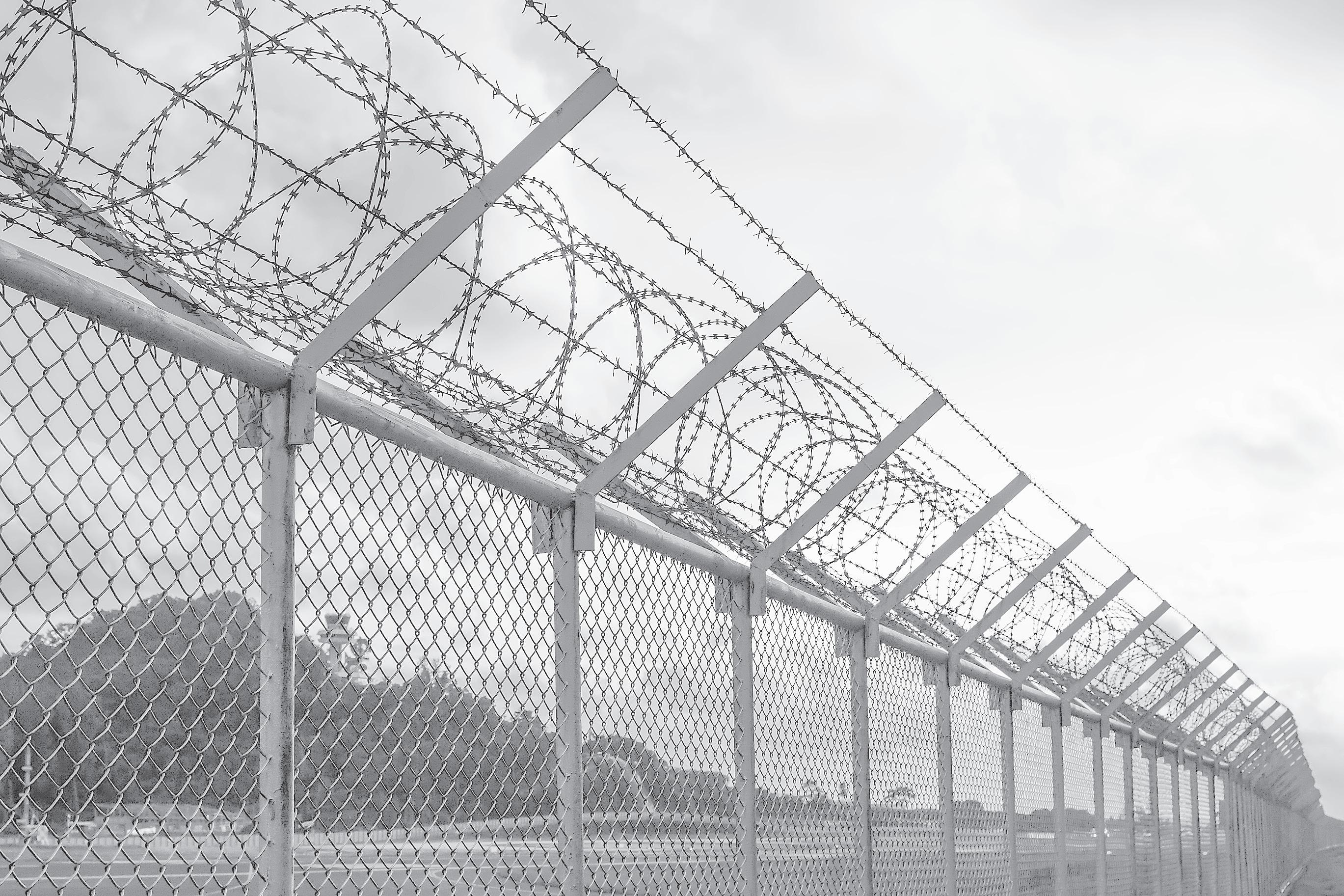
THE practice has an ugly name and an uglier intent: arbitrary detention in Stateto-State relations means this: tyrannical regimes seize innocents to make other governments submit to their wishes. As I said on October 28, 2025, at the United Nations, this is “not diplomacy; it is coercion in daylight.” The principle at stake concerns every nation, large or small.
For large powers, such acts of arbitrary arrest and detention are an affront. For small states, they are a tough trial of their capacity to defend their citizens. Small countries have neither vast consular networks nor military leverage. When their citizens cross borders - to study, to trade, to seek medical care - they travel in the belief that law will protect them. But if the law can be manipulated to turn a student, a journalist, or a businessperson into a hostage with whom to bargain, then traveling citizens of every small state are at risk.
That is why I considered it important to accept the invitation to launch the Report of the Independent International Panel on Arbitrary Detention in State-to-State Relations at the United Nations in New York on October 28, 2025. The report is a firm step on the path to giving citizens of small countries a vital layer of protection in a world where tyranny and organized crime thrive in many places. Six eminent jurists formed
By SIR RONALD SANDERS
the Panel. In their report, they expose a hybrid crime - part hostage-taking, part torture, part prohibited intervention - and always, in the words of the Panel, “a grave abuse of State authority and an affront to human rights and the peaceful conduct of international relations.”
The Panel’s findings are unflinching. They show that such detentions breach multiple pillars of international law: the Universal Declaration of Human Rights, the International Covenant on Civil and Political Rights, the Vienna Convention on Consular Relations, and the 1979 Hostages Convention. Yet because the existing instruments scatter responsibility across different processes, enforcement remains weak. The result is impunity, especially when the perpetrator is powerful.
To close this gap, the Panel proposes that nations should consider requesting an Advisory Opinion from the International Court of Justice (ICJ). This is Recommendation 26 of the Report, and it deserves the same courage that small states showed in securing the ICJ Advisory Opinion


on Climate Change. In both cases, the logic is identical: when global norms are endangered by the actions of the strong, the weak must act together to restore the law’s clarity and conscience.
Why the ICJ is an effective route
As climate catastrophe threatens humanity’s survival, it was not the major emitters that carried the case to The Hague - it was small islands. Vanuatu, Antigua and Barbuda, and others forged a coalition that asked the Court to pronounce what should have been obvious: that States have legal duties to prevent environmental harm to present and future generations. The Court’s July 2025 opinion confirmed those duties and transformed the terrain of climate justice.
The same strategic imagination is now required to confront arbitrary detention. Small states have a collective interest in codifying what conscience already tells us: that a person’s liberty must never be collateral in interstate bargaining. The ICJ is the only global body capable of authoritatively declaring that this practice constitutes an internationally wrongful act, violating both human rights and the sovereign equality of States.
The Government of Antigua and Barbuda, led by Prime Minister Gaston Browne, recognized this early. Antigua and Barbuda was the first small state to sign the Declaration Against Arbitrary Detention in Stateto-State Relations launched by Canada in 2021, because we understood that protecting our people abroad requires international reinforcement of the law. For small nations, a rules-based order is not a philosophical preference; it is a survival mechanism.
A Constitutional Compass
This cause also resonates deeply within the domestic legal heritage of Canada as well as Commonwealth Caribbean countries.

For instance, on November 1, 2025, Antigua and Barbuda’s Independence Constitution will mark its 44th anniversary, and central to it—enshrined in Section 5: Protection of the Right to Personal Liberty—is the guarantee against arbitrary arrest and detention.
Several Central American and South American countries have similar constitutional provisions, but some governments fail to respect them, particularly in relation to political dissidents.
Where this constitutional architecture is upheld by the governments, it mirrors the very norms that the international community must now entrench. The principle is simple: no one’s freedom should depend on power; it should depend on law.
From Declaration to Law
The guiding principles of the Declaration
Against Arbitrary Detention in State-to-State Relations are rooted in Article 9 of the Universal Declaration of Human Rights —“No one shall be subjected to arbitrary arrest, detention or exile”—and Article 36 of the Vienna Convention, guaranteeing consular access. But declarations alone do not deter abusers. The Panel warns that the “fragmented” legal response has emboldened offenders and left victims without remedy. It calls for a coherent body of law— one that unites human-rights obligations, State responsibility, and individual criminal accountability.
An ICJ Advisory Opinion would crystallize these dispersed norms into a single judicial pronouncement, defining the practice as an internationally wrongful act that triggers obligations of cessation, reparation, and non-repetition. The Court’s reasoning would guide
States, regional bodies, and domestic courts. It would empower the UN Working Group on Arbitrary Detention and give moral and legal weight to sanctions and listing mechanisms. Most importantly, it would tell victims and their families that international law has not abandoned them.
Small states have long been the moral conscience of the international system. They defend the UN Charter because they know that without law, they have no defence at all. As I said at the launch of the Panel’s report at the UN, “the law must not be the privilege of the powerful but the protection of the powerless.”
The author is the Ambassador of Antigua and Barbuda to the United States and the OAS, and Dean of the OAS Ambassadors accredited to the OAS. Responses and previous commentaries: www. sirronaldsanders.com
A LEADING business-
man whose proposals on a wide range of topics have provoked national discussions for a better Bahamas today added a new item to the national agenda for change – transformation of how the country retains and attracts seniors to its shores.
Mario Carey commented on what he called “an urgent need to reassess and readdress how we treat our senior citizens” after researching why The Bahamas appears to be losing ground,with increasing numbers of elderly seeking other destinations to call home.
“The time has come for The Bahamas to take a fresh look at how we treat our senior citizens,” said Carey. “The Bahamas is at great risk of losing great human resources, the knowledge and wisdom of many of our elders as at least 10 destinations from Panama to Portugal, Mexico to Malaysia have introduced programs that make life more attractive and affordable for those over 65.”
Carey said he began comparative research following a recent eye-opening trip to Panama where, much to his surprise, he learned seniors were entitled to discounts on everything from pharmaceuticals and medical treatments to movie theatres. Seniors, he said, were courted for their knowledge and recognized for their multiple contributions, he said, treated with honour and care.
“There is a powerful campaign to seniors playing out in at least a dozen countries around the world, countries like Panama and Costa Rica, that are rolling out the red carpet for those over 60 or 65,” said Carey. “They are setting a trend, understanding how much value retirees can bring to their economy and their culture.”
Meantime, Carey said, life can be very hard for seniors in The Bahamas.
“As people age, medical expenses increase and the need for good medical care is essential, but we understand the challenges with our hospitals, one being out of reach for many financially and the other facing regular shortages and issues. The cost of living in The Bahamas is very expensive. As people age, insurance rates increase and can be so high as to be unaffordable or the insurer you have been paying all your life says you are no longer eligible,” said Carey. “National Insurance and pensions don’t begin to cover monthly expenses

for most.”
Medical needs often go unattended because of cost and availability of services to the elderly, he said.
“One of the most prominent experts in the country has said there are 10 dementia patients who need attention and care for every one who patient is receiving treatment,” said Carey, “and dementia is most often associated with age, though there can be early onset.”
Benefits in The Bahamas are few -- a senior discount for Bahamians on Real Property Tax but that vanishes if the senior receiving it uses a room in the home or on the property for short-term rental income. There is a slight discount on Water & Sewerage billing, and some banks offer a reduced fee on current accounts.
“Overall, unless you are very wealthy, being elderly in The Bahamas is a struggle. Nothing seems to work in your favour – insurance, medical, cost of living, lack of benefits connected with age. In Panama, for instance, there is a 50 percent discount on movies and entertainment for those over 65. You walk into a shop and it’s 10 to 20 percent off on everything from
clothes to shoes, 10 percent on medications, 15 percent on hospital stays. Hotels and flights are heavily discounted.”
Nation-building concepts
Carey, a prominent businessman best known for a real estate career that includes more than $3billion in transactions, has devoted more time in the last few years to nation-building concepts.
He’s proposed a start-up entry visa program, advocated for a one percent levy on new investments to fund unmet social service and food security needs, urged removal of antiquated restrictive covenants that prevent highest and best use of prime property, urged greater enforcement of the Disabilities Act, created a new model for permanent residency and called for far tougher protection of the country’s marine resources from neighbouring predators who fish commercially under the guise of tourism. This time he said he is using his voice as a platform for change – not only to keep The Bahamas from losing ground to other destinations but

to make life easier and better for those over 65 who call The Bahamas home and have no interest in moving.
“We need to find a way to create a kinder, gentler, more attractive and affordable culture that treats our seniors with the respect they deserve,” said Carey. “Our cost of living is too high, our benefits, especially medical and insurance, are too difficult.”
While Carey points again to Panama where he says the cost of living is far lower than in the U.S. with consumer prices 35 percent lower and rent 56 percent lower and a couple can live well on between $2000 and $4000 a month, he said more countries are joining the lure of the elderly. Costa Rica, he notes, has
a strong universal health care system, no taxation on foreign income and a couple can live well on $2800 a month. Cost of living in Greece is even lower, at less than $1150 a month, says Carey, with a Golden Visa through real estate investment available, Italy attracting those who want cultural immersion in a sunny climate with a low cost of living.
“Cyprus, Malta, Mexico and especially Portugal along with Panama and Costa Rico are all strong contenders in the race to satisfy those who are looking for their best life in their Golden Years,” said Carey. “If The Bahamas wants to retain retirees – citizens, residents, investors, professionals -- who in their retirement must take into account the basics
of affordable health care, insurance, cost of living and lifestyle, we need to act now.
“There are couples today who are packing up and leaving for at least half the year, Bahamians born here who never wanted to leave, never dreamt they would need to. They are leaving not because they don’t love it, but because they cannot afford to stay full-time or do not want to stay when it is so much easier to be respected and treated like gold in their Golden Years somewhere else.
“Let us take a look with fresh eyes at our seniors and find a new approach to making their latter years as fine as they made our younger ones.
“Senior citizens should be able to say, ‘It is better in The Bahamas.’”
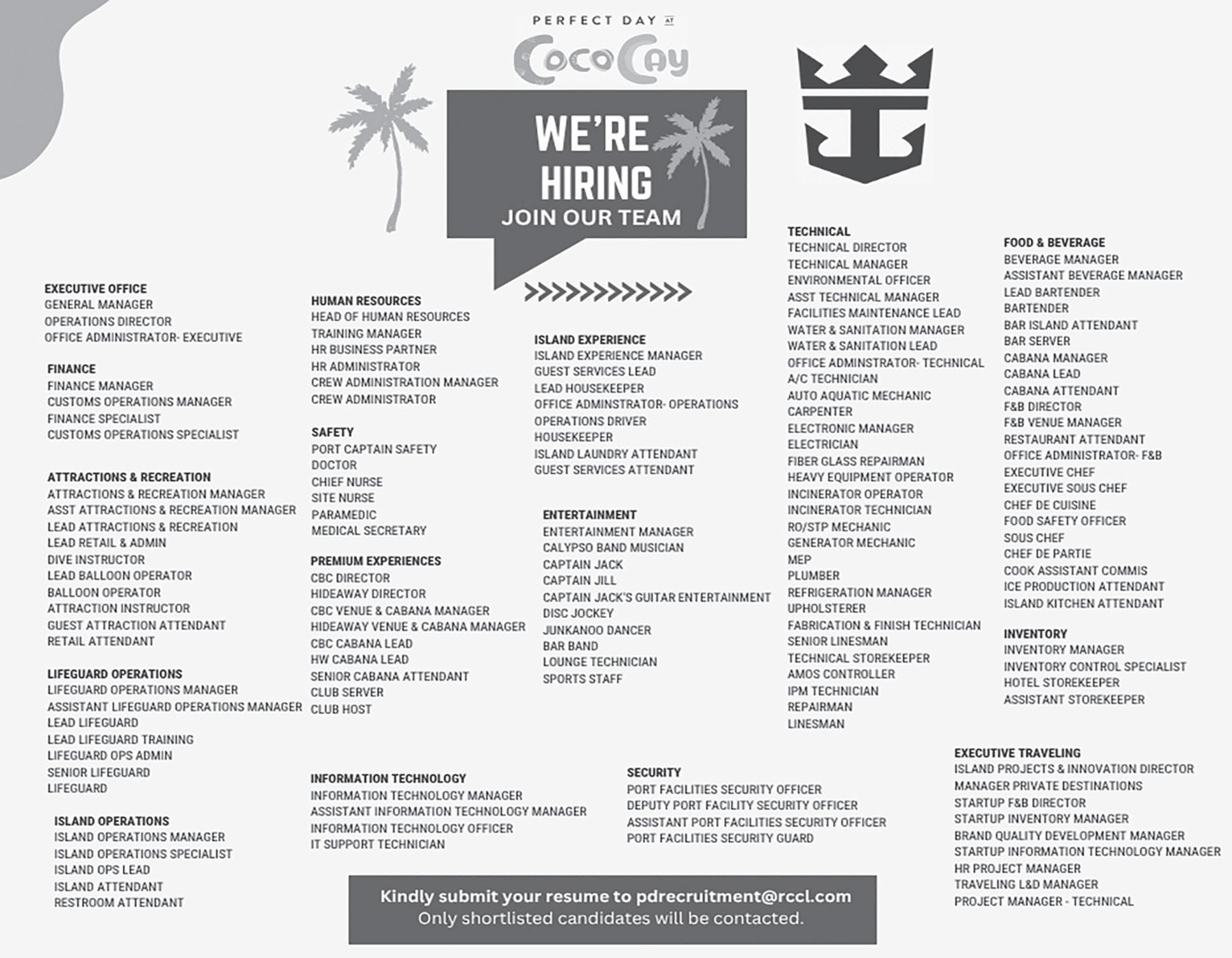
Leandra Rolle Tribune Chief Reporter lrolle@tribunemedia.net
THREE police officers are under investigation in connection with last month’s escape of an accused murderer from the Magistrate’s Court Complex on South Street.
Police Commissioner Shanta Knowles confirmed yesterday that authorities are still searching for D’Angelo Culmer and again appealed for anyone with information on his whereabouts to come forward.
“We want to remind the public that harbouring him could lead to a criminal charge,” Commissioner Knowles told The Tribune.
Culmer escaped around 3.30pm on October 2 from the South Street complex while wearing a blue T-shirt and light blue jeans. Police said he has tattoos of lips on his neck and the name “Tiffany” on his right chest.
Commissioner Knowles declined to comment on how the escape occurred but confirmed that three officers are being investigated.
“I don’t want to go any further than that because the matter is still being investigated,” she said, adding that security protocols have since been strengthened to prevent a recurrence.
Culmer had been remanded to prison in February 2024, accused of killing 39-year-old Rudiska Bethel in a drive-by shooting on Ragged Island Street on January 31. At the time of the alleged murder, he was already on bail for attempted murder.
His disappearance marks one of the longest lapses between an inmate’s escape from custody and recapture in recent years. In 2022, a 25-year-old man who fled the same court complex was recaptured within two days.


Pavel Bailey Tribune Staff Reporter pbailey@tribunemedia.net
A WOMAN was granted bail on Friday after she was accused of stealing more than $30,000 while working in the accounts department of a local security company.
Prosecutors allege that Richan Thompson, 29, while employed at Guardsman Bahamas Ltd, stole $7,043.62
belonging to Paint Place on August 21 in New Providence.
Thompson is also accused of stealing $28,687.20 belonging to GR Sweeting Company between August 22 and 27, while still working at Guardsman.
She pleaded not guilty to three counts of stealing by reason of employment when she appeared before Senior Magistrate Kendra Kelly Burrows.
Thompson was granted $9,900 bail with one or two sureties. As part of her bail conditions, she must sign in at the Fox Hill Police Station on the first Monday of every month by 6pm. She is scheduled to return to court for trial on January 26, 2026.
Levan Johnson represented the defendant, while Sergeant Vernon Pyfrom served as the prosecutor.
Pavel Bailey Tribune Staff Reporter pbailey@tribunemedia.net
A MAN was sentenced to three months in prison on Friday after admitting to breaking into a church and injuring a man during two separate incidents on Eleuthera.
Ricardo Mackey, 24, broke into the Mission Church of God in Lower Bogue, sometime between October 21 and 22. He was
also accused of stealing $200 worth of meat from the church. Mackey was further charged in connection with a separate incident in which he injured Javargo Toney during a physical altercation on September 26.
While he pleaded not guilty to the stealing and receiving charges, Mackey pleaded guilty to sacrilege and causing harm when he appeared before Senior Magistrate Kara Turnquest
Deveaux. The theft-related charges were later withdrawn.
The defendant apologised in court, telling the magistrate he had been ‘going through a rough time’. After reprimanding him for violating the sanctity of a church and attacking an innocent man, Magistrate Turnquest sentenced Mackey to three months in prison on each count.
Inspector Wilkinson prosecuted the matter.

THIRTY-EIGHT foreign nationals were convicted in Magistrate’s Court this week for various immigration offences, including overstaying and illegal landing.
According to the Department of Immigration, 14 Haitian nationals, five Chinese nationals, one Jamaican, and one Peruvian appeared before Magistrate Abigail Farrington
on Wednesday, where all pleaded guilty to the charges. They were ordered to be handed over to the Department of Immigration for deportation following payment of fines or
completion of their sentences. Additionally, on Tuesday, 15 Haitian nationals and two Jamaicans were convicted in Magistrate’s Court for similar offences. They received fines
ranging from $300 to $2,000 and prison sentences of between three months and two years. The Department of Immigration reiterated its commit-
ment to enforcing the laws of The Bahamas and urged members of the public to report suspected immigration violations by calling 604-0249 or 604-0171/2.

A US-registered aircraft was forced to land without its landing gear at Exuma International Airport around 5pm Friday after experiencing a mechanical malfunction, authorities confirmed.
The Aircraft Accident Investigation Authority (AAIA) said the Piper PA34 aircraft, registration N9528C, suffered a landing gear failure that caused it to touch down without its wheels.
By AVA TURNQUEST Tribune Digital Editor
AML FOODS Limited has launched its 10th annual Feed 5000 Holiday Feeding Programme, marking the milestone with a $50,000 donation as the company celebrates its 50th anniversary. The initiative, which began nine years ago, has grown into a symbol of community spirit and generosity, according to Renea Bastian, vice president of marketing and communications. With the support of customers, staff, and corporate partners, the company has raised and distributed more than $500,000 in food vouchers, feeding over 100,000 Bahamians since its inception.
From November 3 to December 17, customers are invited to join the effort by purchasing or donating a $50 Christmas Meal Package at any Solomon’s, Solomon’s Fresh Market, Cost Right, Exuma Markets, or Eleuthera Markets location. Members of the My Solomon’s Smart Rewards programme can also donate their loyalty points toward the cause. Donations can be made instore or online through the company’s retail websites, including solomonsfreshmarkets.com, dominos242.com, and exumamarkets.com.
Funds raised will be distributed through community partners including the Bahamas Feeding Network, Red Cross Grand Bahama Branch, Salvation Army Eleuthera,
and the One Exuma Foundation.
Ms Bastian said the milestone year highlights AML’s long-standing commitment to giving back.
“As AML Foods Limited celebrates 50 years of serving the Bahamian people, our passion for giving back remains stronger than ever,” she said.
“The Feed 5000 programme continues to touch lives across our islands, bringing hope, comfort, and nourishment to families who need it most.”
Individuals, civic groups, and businesses are encouraged to contribute by purchasing meal packages instore or contacting AML’s corporate office for more information.

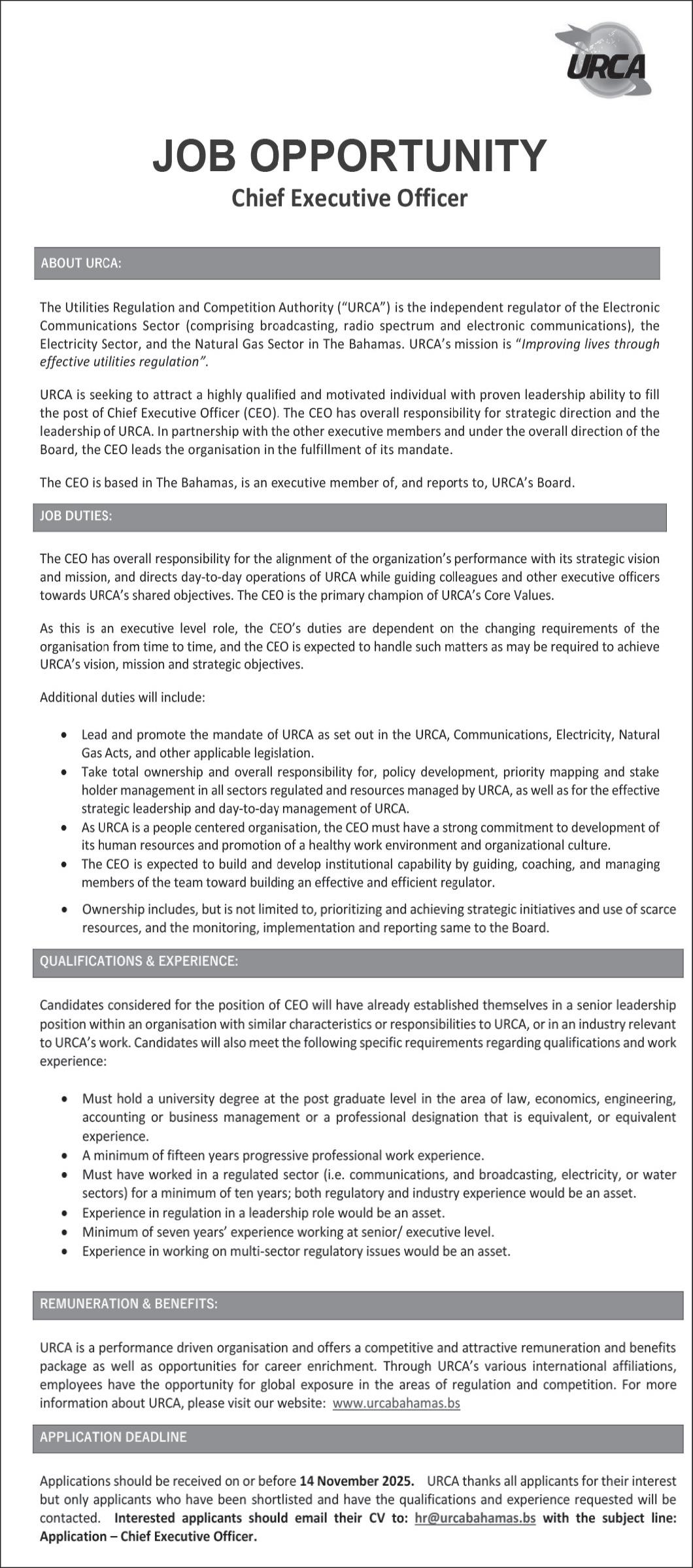
By GABRIELA AOUN ANGUEIRA Associated Press
THE updates sent by friends and neighbours on WhatsApp confirmed what fisher Prince Davis already feared: Hurricane Melissa put a hole in the stern of his 50-foot (15-meter) fishing boat, and damaged the cabin and back deck.
His father’s boat was nowhere to be found. The roof of the house Davis and his parents shared in the small Jamaican fishing community of White House in Westmoreland parish was also destroyed.
Davis was in Nicaragua, where he’d flown shortly before the storm to find new customers for his fish business. But now his livelihood, and the livelihoods of many in his community, were in peril.
“It’s going to be very rough” said Davis. “With the damage now, no one will be buying products.”
About 29 kilometres (17 miles) northwest in Amity, also in Westmoreland parish, Denver Thorpe lost 15 acres (6 hectares) of mango trees and two greenhouses on his farm.
“There’s absolutely nothing,” said Thorpe, a farmer and regional manager for the Jamaica Agricultural Society, a farmer advocacy organization.
Hurricane Melissa is blamed for at least 28 deaths in Jamaica, bringing catastrophic winds up to 185 mph (298 kph) and storm surge that wrecked homes and public infrastructure.
While official damage assessments are still underway, experts said it’s already clear that one of the strongest landfalling Atlantic hurricanes ever recorded also dealt a devastating blow to tens of thousands of Jamaican fishers and

farmers who feed their families and nearby communities.
Similar impacts will be felt by some of Cuba and Haiti ‘s small producers, said Lola Castro, World Food Program regional director for Latin America and the Caribbean.
“I would say every (crop) that was on the path has been damaged, there’s no discussion on that,” said Castro. “Some of the fruit trees may be recovered, some of the temporary crops will not be recovered at all.”
The destruction will impact how residents earn income and feed their families at a time when they must also rebuild homes and communities. There were already 10 million food-insecure people across the affected countries of Haiti, Jamaica and the Dominican Republic, said Castro. The WFP does not have that data for Cuba.
In Jamaica, the destruction comes just 15 months after Hurricane Beryl impacted more than 50,000
farmers and 11,000 fishers, and caused $4.73 billion Jamaican dollars (about $29 million) in losses, according to the Ministry of Agriculture, Fisheries and Mining.
“We were just about turning the corner,” said Thorpe. ‘The lifeblood of the most vulnerable’
Jamaica’s agriculture ministry did not respond to questions about sector impacts, but the country has more than 200,000 farmers tending livestock and growing bananas, melons, cocoa and much more.
The food produced is for domestic consumption and export — Jamaica is one of the world’s largest yam exporters and its coffee growers generate $25 million annually, according to the Jamaica Coffee Exporters Association.
Around 80% are smallscale producers, working on 2 hectares of land or less, said Donovan Campbell, geography professor and director of the University

what they catch, and customers won’t buy what they can’t keep cold. Lack of tourism will hurt demand, too. The slowdown is worse for fishers who use most of their catch to feed their families and sell a little extra, he said. “That small income every day maintains their house and their family and their school and children.”
There are also special risks for women producers, said Davis and Campbell, many of whom are heads of household who support their children with the small amounts they sell.
Compounding crises in Cuba and Haiti
Cuba and Haiti face similar challenges, exacerbated by their political and economic crises.
of the West Indies’ western campus.
“Small-scale fishing and small-scale farming is what most people use to make a living,” he said. “It is really the lifeblood of the most vulnerable in our society.”
Farmers use October rains to plant crops to harvest before Christmas.
Before the storm, the agriculture ministry urged fishers to move equipment out of harm’s way and farmers to move livestock and harvest any crops they could.
The devastation exceeded most expectations. Officials Wednesday said St. Elizabeth parish, known as Jamaica’s “breadbasket,” was “ under water.”
The parish had over 35,000 registered farmers and fishers as of 2022, according to the Jamaica Information Service.
For fishers, Davis said it’s not just losing boats, nets and traps that endangers their work. Without electricity, there’s no ice to store
The storm unleashed terrible flooding in southern Haiti and is blamed for 31 deaths in the country, where hunger was already rising.
Castro of the World Food Program said the organization is concerned about the impact to some of Haiti’s female producers, from whom the WFP typically buys produce to supply local schools.
“We may need to bring food from other parts of the country if available or even having to import,” said Castro.
In Cuba, the evacuation of 735,000 people meant the country suffered no known deaths, but Melissa’s passage could worsen challenges in feeding Cubans. The country faces a severe economic crisis and spends some $2 billion annually importing food products.
Local officials said there was damage to plantain, corn and cassava crops, coffee, various vegetables and trees across the five affected eastern provinces.
Government officials said Melissa’s heavy rainfall did benefit dams and reservoirs, after the eastern part of the country had been suffering from a severe drought and water shortage.
“That is one of the silver linings,” said Margarita Fernandez, executive director of the Caribbean Agroecology Institute in Vermont. CAI is raising funds to send directly to farmers and cooperatives there. The United Nations Food and Agriculture Organization also delivered seed to Cuba ahead of the storm, a spokesperson said. Help arrives in phases
Relief efforts across the northern Caribbean are focused on immediate needs for now, as first responders and humanitarian organizations provide shelter, health care, food and clean water, and restore power and communications.
Food producers will soon need cash to make up for lost income, help replacing equipment and animals as well as new seed.
The Jamaican government keeps reserve funds, parametric insurance policies and catastrophe bonds for disasters. The government and nonprofits helped farmers and fishers after Hurricane Beryl replace what they lost.
But it can take a long time for that help to reach small scale producers, said Campbell.
With airports open again, Davis is looking for a flight to get back to White House. He needs to fix his boat, and his roof, but he doesn’t know when he will sell fish again.
“My worry is about when will the economy will be back to normal, where life goes on as it was before,” said Davis. “Everyone is picking up the pieces.”









